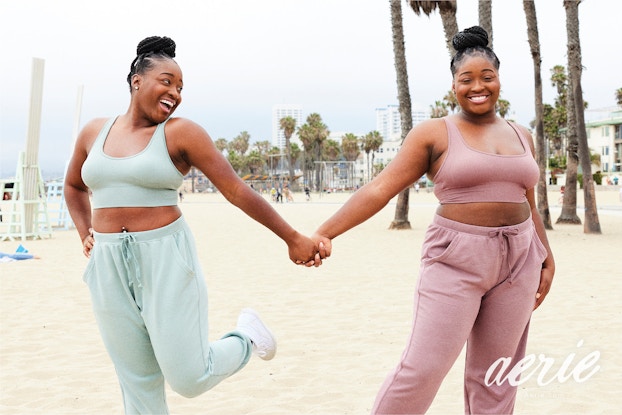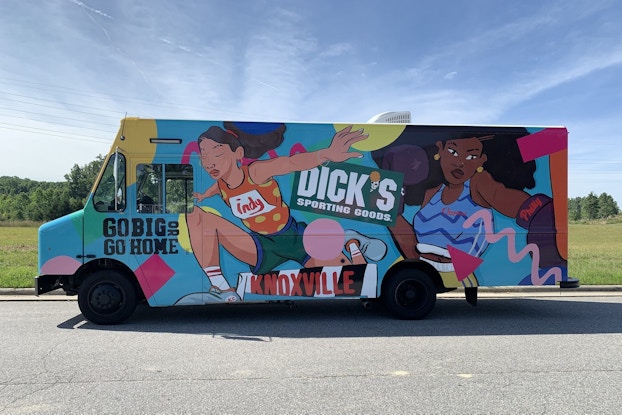
Why it matters:
- Born between 1997 and 2012, Gen Z is the most diverse generation of consumers, and they are gaining spending power: They’re expected to become the nation’s largest demographic cohort by 2034.
- Gen Z rejects company-fed messaging and values authenticity from brands, such as marketing that features everyday people in untouched photos, reflecting diversity in race and body size to gender identity. The demographic also looks to influencers on visual social media platforms like TikTok and Instagram to inform their buying decisions.
- Against that backdrop, brand strategies aimed at Gen Z include video interviews with influencers from apparel retailer Aerie, and a Doritos TikTok campaign showcasing the diversity and individuality of the LGBTQI+ community.
Brands including Aerie, Dick’s Sporting Goods and Doritos are leveraging the visual power of social media platforms like TikTok, Instagram and YouTube to attract Gen Z consumers with messages that showcase diversity, individuality and authenticity.
Gen Z, people born between about 1997 and 2012, accounts for over 67 million, or 20.5%, of the total U.S. population. They’re just starting their careers and gaining some spending power, so marketers should take note: Gen Z is predicted to become the nation’s largest consumer cohort by 2034, according to a Morgan Stanley report.
Gen Z’s actual annual spending power is difficult to ascertain because most Gen Zers have not yet joined the workforce, but estimates range as high at $323 billion, according to a Snapchat report.
‘They are looking for brands to be authentic, and display that with actions’
Gen Z’s view of the world has been shaped by two economic downturns: the COVID-19 pandemic and the racial turmoil of 2020.
They tend to be financially conservative, having seen the effects of the 2008 recession and the current slowdown caused by the pandemic, said Hana Ben-Shabat, founder of research firm Gen Z Planet and author of the recently published book Gen Z 360: Preparing for the Inevitable Change in Culture, Work, and Commerce.
They also tend to be distrustful of corporations and place a high value on authenticity, which can pose challenges for marketers, she said.
“They are looking for brands to be authentic and to basically say who they are and what they do, and display that with actions,” said Ben-Shabat. “Brands find it difficult to do that, because so much marketing is about embellishment.”
Gen Z consumers can be difficult for marketers to understand, she said, because at first glance there appear to be a lot of contradictions in their behavior. While they celebrate their own individuality and think of themselves as a “brand,” they also believe in others’ individuality, with the notion that “everyone should be celebrated,” she said.
“They feel the ‘me’ and the ‘we’ are equally important,” said Ben-Shabat.
This is reflected in their keen sensitivity to diversity when they shop: As the most diverse generation ever in America, they expect brands to reflect that in their marketing and communications, she said.
“Whether it is racial diversity, gender expression, sexual orientation, body sizes and shapes — you see more brands using ‘real’ people in advertising, and that is a direct response to this generation, because they want authenticity and individuality,” said Ben-Shabat.
According to data from Pew Research, just over half — 52% — of Gen Z are non-Hispanic white, compared with 61% of Millennials in 2002. About a quarter of Gen Zers are Hispanic, 14% are Black, 6% are Asian and 5% are another race or two or more races.
For brands to reach Gen Z consumers, they can’t really do anything without having a proper influencer strategy.
Hana Ben-Shabat, author and founder of Gen Z Planet
Engaging with Gen Z where they congregate — on Instagram, YouTube and TikTok
Gen Z consumers are also digital natives who are voracious consumers of social media — especially visually oriented platforms such as Instagram, YouTube and TikTok, according to report from Sprout Social.
The report found that Gen Z consumers would like to see brands make more use of these social media platforms, with 56% saying they would like to see brands use Instagram more, 38% saying that of YouTube and 35% saying that of TikTok.
“Brands have yet to find the sweet spot on TikTok, but those that lay the groundwork now and start testing content on that platform could have an edge with Gen Z,” the report stated.
A survey by Morning Consult, meanwhile, found that most Gen Z respondents cited YouTube celebrity Jeffree Star, who creates videos discussing cosmetics, as the person they would most trust to recommend a product.
Ben-Shabat said social media influencers — trusted people who offer advice about products and services online — can play an important role in marketing to Gen Z. Because they tend not to trust a lot of brands, Gen Z consumers are more likely to believe consumers like themselves who are using the same social media platforms that they are, she said.
“For brands to reach Gen Z consumers, they can’t really do anything without having a proper influencer strategy,” said Ben-Shabat.
[How Startups Are Tapping TikTok to Build Buzz and Drive Sales]
Aerie taps into Gen Z’s ‘realness’
She cited American Eagle Outfitters as an example of a company that appears to be having success focusing on Gen Z consumers.
American Eagle’s Aerie brand seeks to celebrate diversity and authenticity with digital campaigns that encourage consumers to share their “unretouched #AerieREAL photos.” The brand, which includes leggings, underwear, lingerie, activewear and other women’s apparel, touts that it is “all about being real.” It showcases video interviews with influencers and everyday Gen Z women who talk about self-love, empowerment and positivity.
Video interviews with members of The Rollettes Dance Team, a troupe of women in wheelchairs, and the Nae Nae Twins, TikTok stars with more than 1 million followers, are among the diverse stars featured in the brand’s media communications.
“Aerie is the empowering movement it is today because REAL people (like you!) use their voices to share what they love about themselves, and to lift each other up,” the company states on its website. Our mission is to empower everyone to love their REAL SELVES. Together!”
[Not Just Skin Deep: Marketers From CVS to Startup Geenie Take on Mental Wellness in the Beauty Aisle]

Dick’s Sporting Goods supports female empowerment
Another brand that leverages social media to target Gen Z is Dick’s Sporting Goods, which enlisted young TikTok stars such as lifestyle blogger Nicole Laeno and others for its recent back-to-school campaign, according to research firm YPulse.
Watching entertaining content is the top reason TikTok users visit the platform, according to YPulse’s Social Media Deep Dive report.
“Enlisting young creators to help lead a campaign is one way brands can ensure that they’re meeting Gen Z and Millennials where they’re at,” YPulse said in a recent blog post.
Earlier this year, Dick’s launched a Girl’s Power Panel for girls ages 13 to 17 to provide insights on sports issues and advise the company on product assortments. It followed that with an ad campaign called Inside Moves showcasing the leadership of several of the company’s women executives, meant to inspire young women. The YouTube video for the campaign has amassed more than five million views since it was posted in March.
Doritos Rainbow campaign drives 1 billion TikTok views
PepsiCo’s Doritos brand, which shows support for the LGBTQI+ community with its annual Doritos Rainbow campaign, this year sought to reach young consumers with a TikTok campaign coinciding with Pride month that showcased the diversity and individuality of Gen Z.
The 2021 campaign, featuring the #LiveYourFreedom hashtag, invited TikTok users to create videos of themselves singing the George Michael song “Freedom” along with singer and drag queen Gloria Groove.
According to a case study shared by TikTok, the effort generated 1.05 billion video views and also generated strong ad recall among TikTok users and a lift in the brand’s association with the LGBTQI+ cause.
CO— aims to bring you inspiration from leading respected experts. However, before making any business decision, you should consult a professional who can advise you based on your individual situation.
Follow us on Instagram for more expert tips & business owners’ stories.
CO—is committed to helping you start, run and grow your small business. Learn more about the benefits of small business membership in the U.S. Chamber of Commerce, here.








